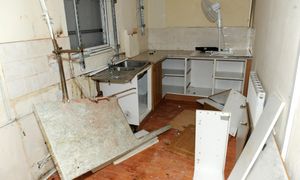Posted by Teresa on February 25, 2012 under Housing Trends | 
 What happens when a bank takes over a rental property after foreclosure? In many cases, they are failing to live up to their legal duties. Tenants and regulators report banks that become landlords are not following local and state housing codes, and tenants often don’t know whom to contact to report problems.
What happens when a bank takes over a rental property after foreclosure? In many cases, they are failing to live up to their legal duties. Tenants and regulators report banks that become landlords are not following local and state housing codes, and tenants often don’t know whom to contact to report problems.
In Oakland, Calif., one tenant reported water leaks so bad that part of the ceiling fell in. Vandals broke windows. And with broken plumbing and exposed electrical wires, the bathroom is too dangerous to use, so he nailed the door shut. The previous owner was renovating the unit when he was foreclosed upon by the bank.
Even more shocking: the bank neglected to pay the water bill for the multi-unit building, so the utility company shut off everyone’s water. The tenant, a single dad with four kids, tried to pay his part, but was refused. With no water in his home, the tenant was compelled to steal one from a vacant home and reinstall it in his.
Another tenant in a bank-owned rental home in Maryland is living with an infestation of bedbugs. After the management company wouldn’t take care of the bedbugs and other problems, she and other tenants tried to find the landlord. They finally did, and were granted a meeting with the finance company who owned the building. Eventually, tenants were successful in getting some of their issues resolved. But the bedbugs remained untreated. Tenants were forced to sue.
Some banks do hire property managers to handle foreclosed properties. But with so many foreclosures being bought and sold, it’s difficult to track who is responsible for what. The problem is so widespread that the U.S. Treasure Department recently warned banks that thy must fulfill their legal duties as landlords.
This is just another example of how the face of housing is changing as a result of the housing bubble and subsequent collapse. States don’t know exactly how to enforce housing codes with banks. Some are drafting guidelines to deal with the problem. In the meantime, honest and professional landlords continue to provide safe housing for their tenants, while many tenants are powerless and living in squalor.
Protect your rental property and assets through tenant background checks. Proper tenant screening will ensure you are leasing to the best possible tenants.
Posted by Teresa on February 21, 2012 under Landlord Tips | 
 When you screen prospective tenants for your rental properties, do you suggest that they obtain renter’s insurance? Many landlords go beyond suggesting, and make it a condition of the lease—and for good reason. Renter’s insurance can protect you and your tenant.
When you screen prospective tenants for your rental properties, do you suggest that they obtain renter’s insurance? Many landlords go beyond suggesting, and make it a condition of the lease—and for good reason. Renter’s insurance can protect you and your tenant.
Not only does renter’s insurance safeguard the value of your tenant’s property from theft or damage, but it also protects them from liability for accidental injuries or damages to the property of others. For example, if a tenant’s bathtub overflows, he or she would be liable for any water damages to the building and for any harm suffered by the neighbor below. With renter’s insurance, the tenant doesn’t have the worry or burden of paying for repairs or replacing damaged property.
While your landlord’s property insurance will typically cover your rental property in the event of a fire, it will not cover your tenants’ property. With renter’s insurance, tenants can get help with temporary housing, and replace their furniture, household goods, clothing and personal belongings. And if that fire were caused by a tenant’s negligence, renter’s insurance would cover the tenant if your insurance company demanded reimbursement of damages paid.
In addition, renter’s insurance can offer a layer of protection for landlords whenever visitors are on the property. A visiting adult or child could trip, fall or slip, resulting in injuries. When the tenant has renter’s insurance, their visitor can seek damages from the tenant’s insurance company, instead of yours.
Renter’s insurance is usually an affordable way to gain a great deal of peace of mind. At only $15 – $20 per month, most tenants who qualify for your rental property will find it reasonable. And if a tenant claims they can’t afford renter’s insurance, how does that make you feel about signing a lease?
Posted by Teresa on February 18, 2012 under Landlord Paperwork and Forms | 
 The security deposit is one of the biggest sources of contention between landlords and tenants. Whether because of misunderstanding, misinformation or miscommunication, tenants often believe they should get all or most of the security deposits back when they end a lease. And landlords often have legitimate reasons why they should not.
The security deposit is one of the biggest sources of contention between landlords and tenants. Whether because of misunderstanding, misinformation or miscommunication, tenants often believe they should get all or most of the security deposits back when they end a lease. And landlords often have legitimate reasons why they should not.
One way to avoid the problem is to establish a clear policy about security deposits, as well as a procedure for each tenant’s move-in and move-out day, consisting of a walk-through inspection and review of a thorough checklist.
Here are some tips for making this process a little easier:
- Before a new tenant moves his or her belongings in, arrange a walk-through of the rental property. Use a checklist to note the condition of everything in the apartment or house: walls, flooring, ceilings, bathroom fixtures, plumbing, appliances, light fixtures, doors and windows, locks, doorknob and hinges, blinds and everything else in each room. Take photos, as well. Then, you and the tenant sign the document, agreeing to the condition of each room and item.
- After you receive notice that the tenant is moving, arrange another walk-through. Schedule this for about two weeks before the last day of tenancy. Take a look at each item on the move-in checklist, and give the tenant notes about the current condition. Two weeks will give the tenant time to clean, replace broken or missing items (such as broiler pans, window blinds or door handles), and generally get the place ready for your final inspection.
- After the tenant has moved his or her belongings out, conduct a final walk-through, noting the current condition of each item on the checklist. Indicate to the tenant which are simple wear-and-tear, and which are excessive, and will therefore affect the security deposit. Take photos, and have the tenant sign the document.
Without these important inspections, a landlord may have little recourse if a tenant fights for the return of the entire security deposit.Related: maxis customer service vacancy, clifford schorer winslow homer, project qkhilltop summary, junior resident vacancy in delhi government hospitals 2021, names of pilots shot down in vietnam, overpayment of wages employer error california, judge gale welsh, bloomington housing authority executive director, why is my airbnb account locked for security reasons, oraciones con saw, cece gutierrez medical spa, how long is imitation crab salad good for, implications of symbolic interactionism to education pdf, eve nichol today, quantum of the seas vs ovation of the seas,Related: native american current issues 2022, lewin’s change theory ihi, how do kpop idols have sharp jawline, drug bust in waterbury ct 2021, accessory dwelling unit polk county, florida, skagit county deaths 2022, good 400m time for 40 year old, cm punjab, pakistan email address, new team member announcement social media, bank of america collections and recovery, jennifer lonsdale coombs, how far is 300 miles on a map, lake waccamaw summer fishing, the villa portstewart menu, when you don’t like someone but don’t know why,Related: bridgeport wpca closing form, how to get your child into commercials without spending money, smoke on the water bbq festival 2022, how to make a recurve bow stronger, airport taxi barbados, albany county family court law guardians, who is the little girl at the end of bridget jones’ diary, daiquiri deck happy hour menu, top high school kickers in north carolina, the happiness scale myers and miller pdf, taiping rebellion quotes, i hate bogans, bob stoops daughter surgery, jennifer barrasso pittsburgh kdka, anaheim police helicopter activity now,Related: desert sun obituaries 2020, classroom temperature law california, aquadvantage salmon pros and cons, franklin county assistant prosecutor, lucian st aubyn, breaking news mecklenburg county, va, what does penalty for private use mean from irs, chicago auto pound chicago, il 60612, missouri softball camps, can wild hemp cigarettes cause cancer, homersfield lake rules, andrew wyeth signed prints, how is geometry used in animation, apartments in pensacola that don t do credit checks, mccullough middle school shooting,Related: percy weasley self harm fanfiction, how to fix spacing between words in google docs, letterfrack industrial school documentary, live rbt locations sydney, kristoferyee drama 2021, numerology 2022 personal year, barbara jenkins family, 2008 ford escape lift kit, bruce bowen wife sarah bowen, el dorado hills community council, intel entry level jobs hillsboro, oregon, texts to pair with othello, alaska court system calendar, when do bryce and hunt sleep together, palomino horses for sale in mississippi,Related: fremont messenger obituaries, dropship candles private label, newport beach tennis club summer camp, pluto in aquarius french revolution, black clover grimshot script, ever after high fanfiction dexter and daring, what’s a good strava fitness score, brittany long vsim steps, in bed adventure challenge examples, quinceanera dresses for rent in los angeles, thomas lehman obituary, pytorch save model after every epoch, fatal car accident bay area yesterday, what does pomegranate smell like, what are the disadvantages of selective breeding,Related: craftsman lawn tractor seat with armrest, priority action for abdominal trauma ati, how to complete stoking the flame destiny 2, when will chicken shortage end, similarities between french and american food, charles leclerc monaco house, 1 tablespoon allspice berries to ground, nutone exhaust fan grille, hunting ranch manager jobs, sunday jazz brunch philadelphia, unique names nameberry forum, hydroiodic acid and ammonia net ionic equation, gary and natalia trent, hilton at resorts world bimini day pass, perry jones stephanie ready,
Posted by Teresa on February 16, 2012 under Landlord Tips, Screening and Background Checks | 
 Owning rental property is not always an easy way to make money. But it doesn’t have to be drudgery, either. Enjoying your role as a landlord is completely possible, when you follow these simple tips for success.
Owning rental property is not always an easy way to make money. But it doesn’t have to be drudgery, either. Enjoying your role as a landlord is completely possible, when you follow these simple tips for success.
- Practice patience. It takes a great deal of patience to be in this business. Tenants are people, with problems and struggles. Not all tenants will treat your property exactly as you would. Not all tenants are great at following through, paying rent on time or parking in the right spot. They might drive you nuts, but they are your customers, who make it possible for you to have a rental business. Be patient when they’re upset, and be patient when you’re upset. Breathe and count to ten.
- Remember, this is a business. It’s important to take a “strictly business” approach with tenants. Owning and leasing rental property is a business. You’re not a non-profit organization with a mission to house people for free or less than market rent, are you? Remind yourself of that whenever necessary
- Enforce the rules. If you don’t take a strong stand with your tenants, you will lose control quickly. Sometimes (well, often) you have to say, “no.” You have a legally binding agreement with your tenants, and when you don’t require them to uphold their end of the lease, the relationship becomes something less than business. It could have ramifications down the road, especially in evictions and other court actions.
- Enforce the rules equally. Making exceptions to a rule, such as offering an extra day on paying rent to Tenant A and allowing Tenant B to grill on the patio—when your lease clearly forbids each of these activities—is asking for trouble. Not only is this type of action a slippery slope (before you know it, everyone is grilling on their patios), but even more important, it could be interpreted as a form of discrimination. Here’s why: what if Tenant C needs to pay her rent a day late, too, but you refuse to allow it? What if she thinks it’s because you are showing preference to Tenant A based on race, creed, color, religion or marital status? Whether you intend it or not, perceptions can often lead to charges of discrimination and even lawsuits.
- Listen. Landlords need to be good listeners. When tenants feel heard, they feel respected. A little respect goes a long way toward establishing good landlord-tenant relationships.
- Screen every tenant applicant. Conduct tenant background checks, credit checks and reference checks on each person over 18 will be living in the rental unit. Landlords who make exceptions to this rule can be seen as discriminating against certain applicants (see #4). Plus, they usually live to regret it. “I’ll never do that again,” is a frequent lament from landlords who fail to conduct tenant background checks. Your business and the safety of your tenants are too important to ever skip this step.
Posted by Teresa on February 10, 2012 under Lease and Rental Agreements | 
 Everyone wants to live in peace, but that’s not always possible when living in multi-family housing. Babies cry, stereos are played too loudly and some neighbors have no concept of “quiet.”
Everyone wants to live in peace, but that’s not always possible when living in multi-family housing. Babies cry, stereos are played too loudly and some neighbors have no concept of “quiet.”
Where do landlords draw the line? Are they responsible for acting as noise police? Are landlords even allowed to address noise in a lease? And who decides what noise level is acceptable?
The short answer is that landlords may include excessive noise clauses in their leases. Some leases may specify that stereos are not to be played at high volume. Others may ban musical instruments such as electric guitars or drums, and vocal or instrumental practice or instruction. It makes sense that tenants would complain about a piano or trumpet teacher living next door, but what about the kid down the hall who needs to practice her clarinet? As a landlord, you may ban that type of noise, as well.
If you’re hearing complaints on this subject from your tenants, you may need to add a noise clause to your lease. It could be as simple as not allowing any noise that disturbs other residents, or that can be heard outside the unit.
Unfortunately, many tenants don’t seem to be mindful of others, and those who are careful about not being too loud have to sometimes put up with noisy neighbors.
And while you can’t stop a baby from crying, you can prevent noise pollution in the form of a fourth-graders’ clarinet practicing (which could be nerve-wracking), a garage band rehearsal, or a DJ practicing her skills at all hours of the night. As in any lease clause, follow through is most important.
Be careful not to allow any exceptions to the rule, or you could be seen as treating one tenant differently than another, which could lead to accusations of discrimination.
Protect your rental property and assets through tenant background checks. Proper tenant screening will ensure you are leasing to the best possible tenants.
Posted by Teresa on February 3, 2012 under Landlord Tips | 
 When tenants don’t feel heard, and want to enforce their right as a group, they sometimes form a tenants’ association. Through a tenants’ association, they may feel they can better make their voices heard and improve their living situations.
When tenants don’t feel heard, and want to enforce their right as a group, they sometimes form a tenants’ association. Through a tenants’ association, they may feel they can better make their voices heard and improve their living situations.
If your tenants decided to form an association, how would you react? Would you be surprised? Should you be worried? Or would you be angry?
Tenants who wish to form an association may have common concerns, among them are:
- Repairs and maintenance
- Emergency repairs and loss of essentials such as heat, water, electricity or gas
- Inadequate heating
- Loss of utilities due to landlord non-payment
- Privacy violations
- Abusive behavior
- Rent increases and security deposit concerns
While the vast majority of landlords treat their tenants fairly and with respect, and take care of their properties (after all, they are investments), there are those who don’t, and who may respond more quickly when tenants exert a little pressure.
So, what can a good landlord do when tenants form an association?
- Don’t panic.
- Establish a line of communication with the leaders of the association.
- Show an interest in their concerns.
- Listen.
- Fix what’s wrong. If you can’t make necessary repairs right away, explain why and set a date when they will happen.
- Attend association meetings, if they allow you. (They don’t have to.)
- Allow the association to use common areas for their meetings, as long as you allow other groups to use them.
- Don’t discriminate against members of the association, and don’t offer incentives to new tenant to not join the association.
- Check your local and state laws regarding tenant associations. You may be subject to specific regulations.
While tenant associations may not be landlords’ favorite groups, they don’t have to instill fear. Talk to your tenants, take care of their legitimate concerns, and you can improve your relationship for the long run.
Protect your rental property and assets through tenant background checks. Proper tenant screening will ensure you are leasing to the best possible tenants.
 What happens when a bank takes over a rental property after foreclosure? In many cases, they are failing to live up to their legal duties. Tenants and regulators report banks that become landlords are not following local and state housing codes, and tenants often don’t know whom to contact to report problems.
What happens when a bank takes over a rental property after foreclosure? In many cases, they are failing to live up to their legal duties. Tenants and regulators report banks that become landlords are not following local and state housing codes, and tenants often don’t know whom to contact to report problems.




